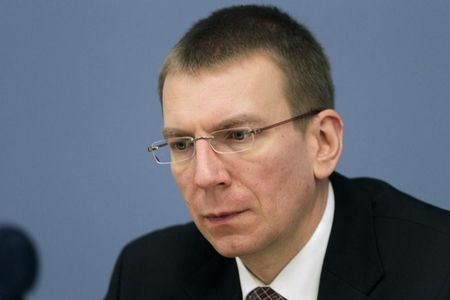RIGA (Reuters) - Latvia's Foreign Minister, flying in the face of conservative sentiment in his small Baltic state, declared in a tweet "I proudly announce I am gay... Good luck all of you" and said he would campaign for legal status for same-sex relationships.
Edgars Rinkevics, using the hashtag "#proudtobegay", was the first government official to come out in Latvia where the issue of gay rights and homosexuality is often frowned upon. By contrast, fellow ex-Soviet state Estonia recently adopted a Cohabitation Act recognising civil unions regardless of gender.
Rinkevics is in a strong position as one of Latvia's most popular politicians. He has sharply criticised Moscow over its handling of a rebellion in the Russian-speaking east of Ukraine, another ex-Soviet state. That echoes widespread fears Moscow may put pressure on Latvia over its 26 percent Russian minority.
Opinion leaders, some politicians and journalists expressed support for the minister's step. "Respect" and "courageous" were the most common words in tweeted comments.
Politicians from neighbouring Lithuania and Estonia also praised him. "Edgars, my friend, admire your courage and sincerity!," Lithuania's Foreign Minister Linas Linkevicius tweeted on Friday.
Estonian President Toomas Hendrik Ilves wrote on the social networking site that Rinkevics was "a very brave man and a very good foreign minister".
Rinkevics said in a tweet he would fight to create a legal framework for "all kind of partnerships" in Latvia.
His spokeswoman confirmed the authenticity of the minister's tweets.
Even his well-known opponent on social networks, leader of the pro-Russian party Concord Nils Ushakovs, said he welcomed his announcement and wished him luck in work and private life.
The Latvian parliament's speaker Inara Murniece of the party National Alliance, which defends conservative values, said on television it was the minister's private initiative to create a legal framework for partnerships which was not included in the new government's declaration.

She did not, however, exclude that parliament may look at this issue if there were majority support.
(Reporting by Aija Krutaine, editing by Daniel Dickson and Ralph Boulton)
